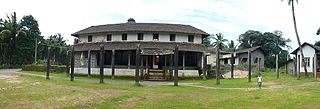
Tulu is a Dravidian language whose speakers are concentrated in Dakshina Kannada and in the southern part of Udupi of Karnataka in south-western India and also in the northern parts of the Kasaragod district of Kerala. The native speakers of Tulu are referred to as Tuluva or Tulu people and the geographical area is unofficially called Tulu Nadu.

Dakshina Kannada district is a district of Karnataka state in India, with its headquarters in the coastal city of Mangalore. It is part of the larger Tulu Nadu region. The district covers an area nestled in between the Western Ghats to its east and the Arabian Sea to its west. Dakshina Kannada receives abundant rainfall during the Indian monsoon. It is bordered by Udupi district to the north, Chikmagalur district to the northeast, Hassan district to the east, Kodagu to the southeast and Kasaragod district of Kerala to the south. According to the 2011 census of India, Dakshina Kannada district had a population of 2,083,625. It is the only district in Karnataka state to have all modes of transport like road, rail, water and air due to the presence of a major hub, Mangalore. This financial district is also known as the Cradle of Indian banking.

Tulunad or Tulu Nadu, also called Bermere sristi or Parashurama Srishti, is a region and a proposed state on the southwestern coast of India. The Tulu people, known as 'Tuluva', speakers of Tulu, a Dravidian language, are the preponderant ethnic group of this region. South Canara, an erstwhile district and a historical area, encompassing the undivided territory of the contemporary Dakshina Kannada and Udupi districts of Karnataka State and Kasaragod district of Kerala state forms the cultural area of the Tuluver.
Havyaka Brahmins are a Hindu Brahmin community native to coastal Karnataka and the Kasaragod district of Kerala. Havyakas are known by their unique culture and language. They fall under the Pancha-Dravida Brahmin category and are Smartas in religion and follow the Advaita philosophy propounded by Adi Shankaracharya.
The Tulu people or Tuluvas are an ethno-linguistic group from Southern India. They are native speakers of the Tulu language and the region they traditionally inhabit is known as Tulu Nadu. This region comprises the districts of Dakshina Kannada and Udupi in Karnataka and a part of Kasaragod district in Kerala, with Mangalore, Karnataka being the commercial hub. The Census report of 2011 reported a population of 1,846,427 native Tulu speakers living in India.
Bunt is an Indian community, who traditionally inhabit the coastal districts of Karnataka and Kasaragod District of Kerala State. Bunts were originally a warrior class community with agrarian origins, and form the landed gentry of the region. They are the dominant, land-owning farming community of Tulu Nadu and speak Tulu as well as Kundagannada as their mother tongue. The Bunts today are a largely urbanised community with a population size of less than 1 million worldwide.

Tigalari, also known as Tulu script, is a Southern Brahmic script which was used to write Tulu, Kannada, and Sanskrit languages. It was primarily used for writing Vedic texts in Sanskrit. It evolved from the Grantha script. It is called as Tigalari lipi in Kannada-speaking regions and Tulu speakers call it as Tulu lipi. It bears high similarity and relationship to its sister script Malayalam, which also evolved from the Grantha script.
Hegde or Heggade Pergade is a common surname found primarily in the Kanara, Tulu Nadu and Konkan regions of India. It is prevalent among various Hindu communities in these regions, including the Kuruba Gowda, Bunt, Saraswat Brahmins, Kannada Jain, Havyaka Brahmin, and Vokkaliga communities of Karnataka.
The Shivalli Brahmins are a Hindu Brahmin community in Karnataka. They are divided into two groups, the first of who follow the Dvaita philosophy founded by the Vaishnava saint Madhvacharya of Udupi are called Shivalli Madhva Brahmins, and the second of who follow the Advaita philosophy of Adi Shankara are known as Shivalli Smartha Brahmins. Majority of Shivalli Brahmins are Madhvas and only a few of them are Smarthas.
Hebbar is a Hindu surname from Karnataka in India. It is found amongst various Brahmin communities, including Chitpavan Brahmins, Deshastha Brahmins, Havyaka Brahmins, Kota Brahmins, Panchagrama Brahmins, Shivalli Brahmins, Tuluva Hebbars, Sthanika Brahminss, Smartha Brahmins and Hebbar Iyengars.
The Billava, Billoru, Biruveru people are an ethnic group of India. They are found traditionally in Tulu Nadu region and engaged in toddy tapping, cultivation and other activities. They have used both missionary education and Sri Narayana Guru's reform movement to upgrade themselves.

Nagaradhane is a form of serpent worship which, along with Bhuta Kola, is one of the unique traditions prevalent in coastal districts of Dakshina Kannada, Udupi and Kasaragod collectively known as Tulu Nadu, practiced by Tuluva community members. Cobras are not just seen as deities, but as an animal species which should be respected, appeased and protected for multiple social, religious and ecological reasons.
Banakal is a Malnad town in Mudigere Taluk, Chikkamagaluru district of Karnataka, India. This town is situated atop the Charmadi hills in the Western Ghats section. The Western Ghats is one amongst twenty-five identified hot spots for biodiversity conservation in the world. Banakal is surrounded by coffee estates and paddy fields and known for its pleasant weather throughout the year. Banakal town is the headquarters of Banakal Hobli.

Sthānika Brāhmins belong to Hindu Tuluva Smartha Brahmin group.
Mangaloreans are a collection of diverse ethnic groups that hail from the historical locales of South Canara (Tulunaad) on the south western coast of Karnataka, India, particularly the residents native to Mangaluru.

Karkala, also known as Karla in Tulu language, is a town and the headquarters of Karkala taluk in the Udupi district of Karnataka, India. Located about 60 km from Mangalore in the Tulu Nadu region of the state, it lies near the foothills of the Western Ghats. Karkala has a number of natural and historical landmarks, and is a major tourist and transit destination due to its strategic location along the way to Hebri, Sringeri, Kalasa, Horanadu, Udupi, Kollur, Subrahmanya and Dharmasthala.

Tulu Nadu State movement is aimed at increasing Tulu Nadu's influence and political power through the formation of separate Tulu Nadu state from Karnataka and Kerala. Tulu Nadu is a region on the south-western coast of India. It consists of Dakshina Kannada and Udupi districts of Karnataka, and Kasargod district up to the Chandragiri river in Kerala. The Chandragiri river is traditionally considered to be a boundary between Tulu Nadu and Kerala from the fourteenth century AD onwards. The first call for separate Tulu Nadu state was made just after the Quit India Movement in 1942 by Srinivas Updhyaya Paniyadi, a banker and a press owner from Udupi. Mangalore is the largest and the chief city of Tulu Nadu. Tulu activists have been demanding a separate Tulu Nadu state since the late 2000s, considering language and culture as the basis for their demand.
Karnataka is a state in the southern part of India. It was created on 1 November 1956, with the passing of the States Reorganisation Act. Karnataka is bordered by the Arabian Sea to the west, Goa to the north-west, Maharashtra to the north, Telangana and Andhra Pradesh to the east, Tamil Nadu to the south-east, and Kerala to the south-west. The state covers an area of 74,122 sq mi (191,976 km2), or 5.83% of the total geographical area of India. It comprises 30 districts. Kannada is the official language of Karnataka and as per the 2011 census is the mother tongue of 66.5% of the population. Various ethnic groups with origins in other parts of India have unique customs and use languages at home other than Kannada, adding to the cultural diversity of the state. Significant linguistic minorities in the state in 2011 included speakers of Urdu (10.8%), Telugu (5.8%), Tamil (3.5%), Marathi (3.4%), Hindi (3.2%), Tulu (2.6%), Konkani (1.3%) and Malayalam (1.3%).

The Panchagrama Brahmins are a Brahmin community that follow the Smartha Sampradaya. They belong to the Indian state of Karnataka, and reside primarily in the districts of Udupi, Shimoga and Chikmaglur, Bengaluru and other cities.

Madhva Brahmins, are Hindu Brahmin communities in India, who follow Sat Vaishnavism and Dvaita philosophy propounded by Madhvacharya. They are found mostly in the Indian states of Karnataka, Maharashtra, Goa, Tamil Nadu, Kerala, Telangana and Andhra Pradesh.









